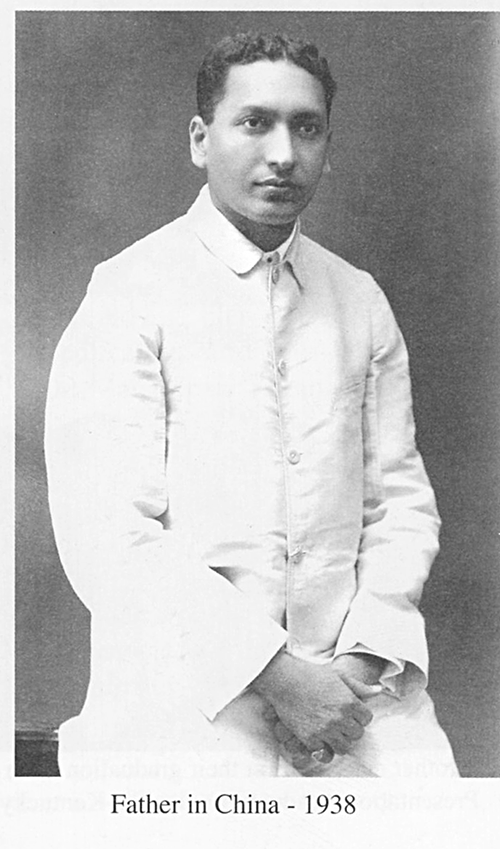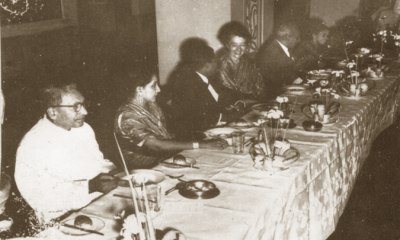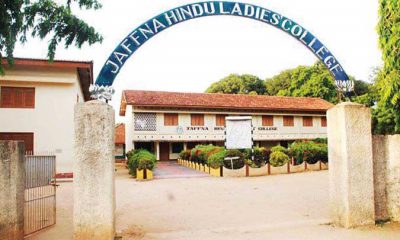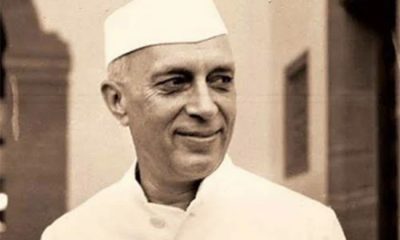Features
FATHER
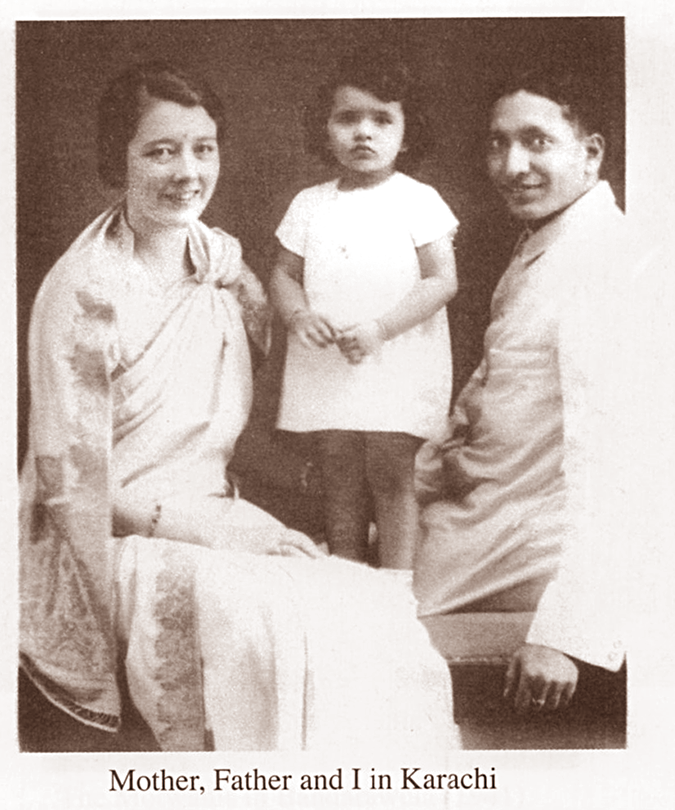
Excerpted from Chosen Ground: The Clara Motwani
Saga by Goolbai Gunasekera
Much of Father’s life was lived away from us. His work as Professor of Sociology both in India and the USA meant that his holiday times did not necessarily dovetail with ours. Mother was more inclined to take us wherever he was working, thus ensuring that vacation time was used as gainfully as possible in educationally guided travel.
The minute Father heard we were coming to India, he would acquire every brochure put out by the Tourist Department. He would then write to us telling us what (to him) were exciting ruins, dams, game reserves, palaces, heritage sites and such like destinations we would be visiting that vacation. Our holding agendas were as perfectly timed as a Bach Fugue.
We were expected to read up, and be thoroughly familiar with the background history of wherever Father decreed we would be going. We often wandered off the beaten track and since five-star hotels were not found dotting the Indian countryside at that time as they do today, much of our accommodation was terribly basic.
The result was that India was ‘done’ so well that we were familiar with much of that vast sub-continent, ranging from Kashmir to Kerala, and from Pondicherry to Calcutta. Our holidays were not pleasure trips. They were seriously educational, and I cannot say that we always enjoyed them.
Su, in particular, had a low tolerance of Father’s idiosyncrasies. She did not believe in keeping her thoughts to herself, unlike me, her far less confrontational elder sister.
“I see no reason to be damn uncomfortable just to see where the Buddha was born,” she complained, after one exceptionally dreary overnight stay near Bodh Gaya. It was all that was available. “I’m not a Buddhist.”
Father almost had apoplexy … a condition in which he often found himself when Su was around.
“You have been brought up as a Theosophist and all religions are to be considered worthy of respect, young lady,” he thundered. “One of the world’s greatest religious teachers hails from this place, and she turns up her silly American nose.”
That last remark needs explanation. Su was born in the USA and carried an American passport. Whenever she was being obstreperous (which was very often, in Father’s opinion) he disclaimed any genetic heritage: Su became Mother’s child. On the other hand, the year that Su won both English Literature and Sinhala Literature prizes in Grade Ten he crowed: “That clever, clever child. She gets her flair for languages from me, of course.”
He would then add modestly: “You know I speak, read and write Sindhi, Hindi, Urdu, Farsi and English as well as any native of those areas.” It was true. Father would often read poems to us in Urdu or Farsi, though we understood not a word. “The beauty of sound is enough,” he would say, continuing to bore us mightily.
At the time Father gained his PhD in Sociology, the subject was not being taught in Indian Universities. In embarking on a crusade to get Sociology included in the better Indian colleges, he enlisted his guardian’s help. Jamshed Mehta had a great deal of influence and he used it now to help his former ward. At the end of this chapter I reproduce the letter Jamshed received from Jawaharlal Nehru, just before Nehru became India’s first Prime Minister.
Father was caught up in the work of the Indian National Congress; and, like many academics, he submitted his proposals to the National Committee for Education. It is worth noting how early in the day the future leaders of India begin planning the education of their country.
Nehru kept his word. Sociology was included in the new curricula of many leading Indian Universities. Father was ecstatic. He embarked on a round of lectures intended to popularize the subject, and did his best to get either Su or me to offer sociology for our university degrees. Neither of us was even remotely interested in it. For this we blamed Father. He had an irritating habit of getting both of us to proof-read his books whenever he felt we had a free moment.
Wading through such exciting tomes as India: A Synthesis of Cultures or The Manu Dharmashastra, Su and I were pretty sick bf the whole topic. I read for a History Honours degree in Bombay, while she opted to do the Home Science course at Lady Irwin College in New Delhi.
Father died the year my daughter, Khulsum, started at my old College (Sophia College) in Bombay. All India Radio announced his passing and gave him credit for having brought sociology to India. It was a tribute Father would have appreciated above all others. He did not have the pleasure of knowing that sociology was Khulsum’s chosen field at that time, although she shifted focus when she transferred to the USA.
It would have delighted him to know that one of his books was recommended to her class as a reference book: Khulsum very much enjoyed telling her professor that the author, Dr. Motwani, was her grandfather. With her Sri Lankan surname, it was unlikely that any connection would normally have been made. But as I said earlier, life moves in circles and my grand-daughter, Tahire, is now doing a degree- in Sociology at St. Lawrence University in New York. She quotes Father as a reference in her work there. Would that he knew.
As a parent, Father would be considered to have been too remote and uninvolved, if judged by today’s criteria of good parenting. He was distant both physically and emotionally. He probably liked us well enough, but we never felt he really loved us. Su and I would discuss this. As said before, we came to the conclusion that the only person Father ever really loved and communicated with was Mother. With her, he was concerned and caring, although it cannot be said that he was an easy husband.
She understood him. But adding to the distance between Father and his offspring was the earlier mentioned fact that he was (inevitably) on a lecture tour at the time of our birth. Ergo, we never really bonded at any stage. If consulted, Mother would have probably put down his inability to show much affection to a lonely childhood, which was probably the case.
Father was a dedicated member of the Masonic Society. It grieved him greatly when the secrets of Masonic ritual became public. He rarely used his Masonic links to further himself, but just once he was tempted. Macmillan’s in Britain had rejected one of his books for printing, as the quota for serious texts that year had been filled. Father wrote to Mr. Harold Macmillan, then Prime Minister of England. In his letter he included a Masonic phrase. His book was accepted.
When fulfilling a two-year lecturing contract in Kansas at Wichita University, Father spoke glowingly of the fabulous collection of silver donated to the Masonic lodge by older members there. Naturally he was a visiting Mason for the duration of his Kansas stint.
When India gained Independence, Father was offered a diplomatic appointment in the newly formed Foreign Office. It would have meant our moving to South Africa where Sir Benegal Rama Rau was being sent as High Commissioner. Putting an academic like Father into a job requiring tact and charm was not one of Nehru’s better ideas. Seeing someone else’s point of view had never been my sire’s forte: he usually felt he was right about everything.
Father knew his own weakness. He turned down the offer, much to Mother’s relief (and Jamshed’s great disappointment), although her personal charm might have done much to mitigate Father’s belligerency.
In his later years, Father paid fewer visits to the US. He had travelled so much that he once told me he used to have nightmares about missing flights and being left in airports. His lecture tours were almost whistle-stop affairs. Sometimes he was just in time to catch a plane for his next engagement. This was specially so in the USA, when bookings of visiting lecturers tended to run very close together.
Father made a distinguished figure in his kurta coat and Nehru cap: a handsome man who kept his youthful appearance with daily Yoga exercises and (he claimed) his vegetarian diet. Father daily stood on his head with no support whatsoever until the age of seventy-five. I was lost in admiration, while Su would acidly ask why anyone would need to do something so patently silly. Fortunately she never dared say this in Father’s presence.
Father had many well-known men and women of letters among his close friends. One of them was Pearl Buck. We read all her books, and were forbidden to ever allow the autographed copies out of our home library. Others were philosophers and sages, such as Jiddu Krishnamurti and George Santayana. I wish now that I had kept Father’s letters. I do not know what happened to them, for he died in the Theosophical Society in Adyar, Chennai, and I did not ask for his personal effects to be forwarded to me. In fact, it never occurred to me how valuable such letters would have been today.
Ananda Bhawan Allahabad, July 10, 1940
Shri Jamshed Nusserwanjee Machimiani Road,
Karachi.
Dear friend,
I have your letter of July 6th with, the pamphlets “Sociology” by Dr. Motwani. I entirely agree with you that sociology as a subject should be included in the curriculum of Indian Universities. I am forwarding this pamphlets to the Secretary of the General Education Sub-Committee of the National Planning Committee.
Yours sincerely,
Jawaharlal Nehru
Features
The heart-friendly health minister

by Dr Gotabhya Ranasinghe
Senior Consultant Cardiologist
National Hospital Sri Lanka
When we sought a meeting with Hon Dr. Ramesh Pathirana, Minister of Health, he graciously cleared his busy schedule to accommodate us. Renowned for his attentive listening and deep understanding, Minister Pathirana is dedicated to advancing the health sector. His openness and transparency exemplify the qualities of an exemplary politician and minister.
Dr. Palitha Mahipala, the current Health Secretary, demonstrates both commendable enthusiasm and unwavering support. This combination of attributes makes him a highly compatible colleague for the esteemed Minister of Health.
Our discussion centered on a project that has been in the works for the past 30 years, one that no other minister had managed to advance.
Minister Pathirana, however, recognized the project’s significance and its potential to revolutionize care for heart patients.
The project involves the construction of a state-of-the-art facility at the premises of the National Hospital Colombo. The project’s location within the premises of the National Hospital underscores its importance and relevance to the healthcare infrastructure of the nation.
This facility will include a cardiology building and a tertiary care center, equipped with the latest technology to handle and treat all types of heart-related conditions and surgeries.
Securing funding was a major milestone for this initiative. Minister Pathirana successfully obtained approval for a $40 billion loan from the Asian Development Bank. With the funding in place, the foundation stone is scheduled to be laid in September this year, and construction will begin in January 2025.
This project guarantees a consistent and uninterrupted supply of stents and related medications for heart patients. As a result, patients will have timely access to essential medical supplies during their treatment and recovery. By securing these critical resources, the project aims to enhance patient outcomes, minimize treatment delays, and maintain the highest standards of cardiac care.
Upon its fruition, this monumental building will serve as a beacon of hope and healing, symbolizing the unwavering dedication to improving patient outcomes and fostering a healthier society.We anticipate a future marked by significant progress and positive outcomes in Sri Lanka’s cardiovascular treatment landscape within the foreseeable timeframe.
Features
A LOVING TRIBUTE TO JESUIT FR. ALOYSIUS PIERIS ON HIS 90th BIRTHDAY

by Fr. Emmanuel Fernando, OMI
Jesuit Fr. Aloysius Pieris (affectionately called Fr. Aloy) celebrated his 90th birthday on April 9, 2024 and I, as the editor of our Oblate Journal, THE MISSIONARY OBLATE had gone to press by that time. Immediately I decided to publish an article, appreciating the untiring selfless services he continues to offer for inter-Faith dialogue, the renewal of the Catholic Church, his concern for the poor and the suffering Sri Lankan masses and to me, the present writer.
It was in 1988, when I was appointed Director of the Oblate Scholastics at Ampitiya by the then Oblate Provincial Fr. Anselm Silva, that I came to know Fr. Aloy more closely. Knowing well his expertise in matters spiritual, theological, Indological and pastoral, and with the collaborative spirit of my companion-formators, our Oblate Scholastics were sent to Tulana, the Research and Encounter Centre, Kelaniya, of which he is the Founder-Director, for ‘exposure-programmes’ on matters spiritual, biblical, theological and pastoral. Some of these dimensions according to my view and that of my companion-formators, were not available at the National Seminary, Ampitiya.
Ever since that time, our Oblate formators/ accompaniers at the Oblate Scholasticate, Ampitiya , have continued to send our Oblate Scholastics to Tulana Centre for deepening their insights and convictions regarding matters needed to serve the people in today’s context. Fr. Aloy also had tried very enthusiastically with the Oblate team headed by Frs. Oswald Firth and Clement Waidyasekara to begin a Theologate, directed by the Religious Congregations in Sri Lanka, for the contextual formation/ accompaniment of their members. It should very well be a desired goal of the Leaders / Provincials of the Religious Congregations.
Besides being a formator/accompanier at the Oblate Scholasticate, I was entrusted also with the task of editing and publishing our Oblate journal, ‘The Missionary Oblate’. To maintain the quality of the journal I continue to depend on Fr. Aloy for his thought-provoking and stimulating articles on Biblical Spirituality, Biblical Theology and Ecclesiology. I am very grateful to him for his generous assistance. Of late, his writings on renewal of the Church, initiated by Pope St. John XX111 and continued by Pope Francis through the Synodal path, published in our Oblate journal, enable our readers to focus their attention also on the needed renewal in the Catholic Church in Sri Lanka. Fr. Aloy appreciated very much the Synodal path adopted by the Jesuit Pope Francis for the renewal of the Church, rooted very much on prayerful discernment. In my Religious and presbyteral life, Fr.Aloy continues to be my spiritual animator / guide and ongoing formator / acccompanier.
Fr. Aloysius Pieris, BA Hons (Lond), LPh (SHC, India), STL (PFT, Naples), PhD (SLU/VC), ThD (Tilburg), D.Ltt (KU), has been one of the eminent Asian theologians well recognized internationally and one who has lectured and held visiting chairs in many universities both in the West and in the East. Many members of Religious Congregations from Asian countries have benefited from his lectures and guidance in the East Asian Pastoral Institute (EAPI) in Manila, Philippines. He had been a Theologian consulted by the Federation of Asian Bishops’ Conferences for many years. During his professorship at the Gregorian University in Rome, he was called to be a member of a special group of advisers on other religions consulted by Pope Paul VI.
Fr. Aloy is the author of more than 30 books and well over 500 Research Papers. Some of his books and articles have been translated and published in several countries. Among those books, one can find the following: 1) The Genesis of an Asian Theology of Liberation (An Autobiographical Excursus on the Art of Theologising in Asia, 2) An Asian Theology of Liberation, 3) Providential Timeliness of Vatican 11 (a long-overdue halt to a scandalous millennium, 4) Give Vatican 11 a chance, 5) Leadership in the Church, 6) Relishing our faith in working for justice (Themes for study and discussion), 7) A Message meant mainly, not exclusively for Jesuits (Background information necessary for helping Francis renew the Church), 8) Lent in Lanka (Reflections and Resolutions, 9) Love meets wisdom (A Christian Experience of Buddhism, 10) Fire and Water 11) God’s Reign for God’s poor, 12) Our Unhiddden Agenda (How we Jesuits work, pray and form our men). He is also the Editor of two journals, Vagdevi, Journal of Religious Reflection and Dialogue, New Series.
Fr. Aloy has a BA in Pali and Sanskrit from the University of London and a Ph.D in Buddhist Philosophy from the University of Sri Lankan, Vidyodaya Campus. On Nov. 23, 2019, he was awarded the prestigious honorary Doctorate of Literature (D.Litt) by the Chancellor of the University of Kelaniya, the Most Venerable Welamitiyawe Dharmakirthi Sri Kusala Dhamma Thera.
Fr. Aloy continues to be a promoter of Gospel values and virtues. Justice as a constitutive dimension of love and social concern for the downtrodden masses are very much noted in his life and work. He had very much appreciated the commitment of the late Fr. Joseph (Joe) Fernando, the National Director of the Social and Economic Centre (SEDEC) for the poor.
In Sri Lanka, a few religious Congregations – the Good Shepherd Sisters, the Christian Brothers, the Marist Brothers and the Oblates – have invited him to animate their members especially during their Provincial Congresses, Chapters and International Conferences. The mainline Christian Churches also have sought his advice and followed his seminars. I, for one, regret very much, that the Sri Lankan authorities of the Catholic Church –today’s Hierarchy—- have not sought Fr.
Aloy’s expertise for the renewal of the Catholic Church in Sri Lanka and thus have not benefited from the immense store of wisdom and insight that he can offer to our local Church while the Sri Lankan bishops who governed the Catholic church in the immediate aftermath of the Second Vatican Council (Edmund Fernando OMI, Anthony de Saram, Leo Nanayakkara OSB, Frank Marcus Fernando, Paul Perera,) visited him and consulted him on many matters. Among the Tamil Bishops, Bishop Rayappu Joseph was keeping close contact with him and Bishop J. Deogupillai hosted him and his team visiting him after the horrible Black July massacre of Tamils.
Features
A fairy tale, success or debacle

Sri Lanka-Singapore Free Trade Agreement
By Gomi Senadhira
senadhiragomi@gmail.com
“You might tell fairy tales, but the progress of a country cannot be achieved through such narratives. A country cannot be developed by making false promises. The country moved backward because of the electoral promises made by political parties throughout time. We have witnessed that the ultimate result of this is the country becoming bankrupt. Unfortunately, many segments of the population have not come to realize this yet.” – President Ranil Wickremesinghe, 2024 Budget speech
Any Sri Lankan would agree with the above words of President Wickremesinghe on the false promises our politicians and officials make and the fairy tales they narrate which bankrupted this country. So, to understand this, let’s look at one such fairy tale with lots of false promises; Ranil Wickremesinghe’s greatest achievement in the area of international trade and investment promotion during the Yahapalana period, Sri Lanka-Singapore Free Trade Agreement (SLSFTA).
It is appropriate and timely to do it now as Finance Minister Wickremesinghe has just presented to parliament a bill on the National Policy on Economic Transformation which includes the establishment of an Office for International Trade and the Sri Lanka Institute of Economics and International Trade.
Was SLSFTA a “Cleverly negotiated Free Trade Agreement” as stated by the (former) Minister of Development Strategies and International Trade Malik Samarawickrama during the Parliamentary Debate on the SLSFTA in July 2018, or a colossal blunder covered up with lies, false promises, and fairy tales? After SLSFTA was signed there were a number of fairy tales published on this agreement by the Ministry of Development Strategies and International, Institute of Policy Studies, and others.
However, for this article, I would like to limit my comments to the speech by Minister Samarawickrama during the Parliamentary Debate, and the two most important areas in the agreement which were covered up with lies, fairy tales, and false promises, namely: revenue loss for Sri Lanka and Investment from Singapore. On the other important area, “Waste products dumping” I do not want to comment here as I have written extensively on the issue.
1. The revenue loss
During the Parliamentary Debate in July 2018, Minister Samarawickrama stated “…. let me reiterate that this FTA with Singapore has been very cleverly negotiated by us…. The liberalisation programme under this FTA has been carefully designed to have the least impact on domestic industry and revenue collection. We have included all revenue sensitive items in the negative list of items which will not be subject to removal of tariff. Therefore, 97.8% revenue from Customs duty is protected. Our tariff liberalisation will take place over a period of 12-15 years! In fact, the revenue earned through tariffs on goods imported from Singapore last year was Rs. 35 billion.
The revenue loss for over the next 15 years due to the FTA is only Rs. 733 million– which when annualised, on average, is just Rs. 51 million. That is just 0.14% per year! So anyone who claims the Singapore FTA causes revenue loss to the Government cannot do basic arithmetic! Mr. Speaker, in conclusion, I call on my fellow members of this House – don’t mislead the public with baseless criticism that is not grounded in facts. Don’t look at petty politics and use these issues for your own political survival.”
I was surprised to read the minister’s speech because an article published in January 2018 in “The Straits Times“, based on information released by the Singaporean Negotiators stated, “…. With the FTA, tariff savings for Singapore exports are estimated to hit $10 million annually“.
As the annual tariff savings (that is the revenue loss for Sri Lanka) calculated by the Singaporean Negotiators, Singaporean $ 10 million (Sri Lankan rupees 1,200 million in 2018) was way above the rupees’ 733 million revenue loss for 15 years estimated by the Sri Lankan negotiators, it was clear to any observer that one of the parties to the agreement had not done the basic arithmetic!
Six years later, according to a report published by “The Morning” newspaper, speaking at the Committee on Public Finance (COPF) on 7th May 2024, Mr Samarawickrama’s chief trade negotiator K.J. Weerasinghehad had admitted “…. that forecasted revenue loss for the Government of Sri Lanka through the Singapore FTA is Rs. 450 million in 2023 and Rs. 1.3 billion in 2024.”
If these numbers are correct, as tariff liberalisation under the SLSFTA has just started, we will pass Rs 2 billion very soon. Then, the question is how Sri Lanka’s trade negotiators made such a colossal blunder. Didn’t they do their basic arithmetic? If they didn’t know how to do basic arithmetic they should have at least done their basic readings. For example, the headline of the article published in The Straits Times in January 2018 was “Singapore, Sri Lanka sign FTA, annual savings of $10m expected”.
Anyway, as Sri Lanka’s chief negotiator reiterated at the COPF meeting that “…. since 99% of the tariffs in Singapore have zero rates of duty, Sri Lanka has agreed on 80% tariff liberalisation over a period of 15 years while expecting Singapore investments to address the imbalance in trade,” let’s turn towards investment.
Investment from Singapore
In July 2018, speaking during the Parliamentary Debate on the FTA this is what Minister Malik Samarawickrama stated on investment from Singapore, “Already, thanks to this FTA, in just the past two-and-a-half months since the agreement came into effect we have received a proposal from Singapore for investment amounting to $ 14.8 billion in an oil refinery for export of petroleum products. In addition, we have proposals for a steel manufacturing plant for exports ($ 1 billion investment), flour milling plant ($ 50 million), sugar refinery ($ 200 million). This adds up to more than $ 16.05 billion in the pipeline on these projects alone.
And all of these projects will create thousands of more jobs for our people. In principle approval has already been granted by the BOI and the investors are awaiting the release of land the environmental approvals to commence the project.
I request the Opposition and those with vested interests to change their narrow-minded thinking and join us to develop our country. We must always look at what is best for the whole community, not just the few who may oppose. We owe it to our people to courageously take decisions that will change their lives for the better.”
According to the media report I quoted earlier, speaking at the Committee on Public Finance (COPF) Chief Negotiator Weerasinghe has admitted that Sri Lanka was not happy with overall Singapore investments that have come in the past few years in return for the trade liberalisation under the Singapore-Sri Lanka Free Trade Agreement. He has added that between 2021 and 2023 the total investment from Singapore had been around $162 million!
What happened to those projects worth $16 billion negotiated, thanks to the SLSFTA, in just the two-and-a-half months after the agreement came into effect and approved by the BOI? I do not know about the steel manufacturing plant for exports ($ 1 billion investment), flour milling plant ($ 50 million) and sugar refinery ($ 200 million).
However, story of the multibillion-dollar investment in the Petroleum Refinery unfolded in a manner that would qualify it as the best fairy tale with false promises presented by our politicians and the officials, prior to 2019 elections.
Though many Sri Lankans got to know, through the media which repeatedly highlighted a plethora of issues surrounding the project and the questionable credentials of the Singaporean investor, the construction work on the Mirrijiwela Oil Refinery along with the cement factory began on the24th of March 2019 with a bang and Minister Ranil Wickremesinghe and his ministers along with the foreign and local dignitaries laid the foundation stones.
That was few months before the 2019 Presidential elections. Inaugurating the construction work Prime Minister Ranil Wickremesinghe said the projects will create thousands of job opportunities in the area and surrounding districts.
The oil refinery, which was to be built over 200 acres of land, with the capacity to refine 200,000 barrels of crude oil per day, was to generate US$7 billion of exports and create 1,500 direct and 3,000 indirect jobs. The construction of the refinery was to be completed in 44 months. Four years later, in August 2023 the Cabinet of Ministers approved the proposal presented by President Ranil Wickremesinghe to cancel the agreement with the investors of the refinery as the project has not been implemented! Can they explain to the country how much money was wasted to produce that fairy tale?
It is obvious that the President, ministers, and officials had made huge blunders and had deliberately misled the public and the parliament on the revenue loss and potential investment from SLSFTA with fairy tales and false promises.
As the president himself said, a country cannot be developed by making false promises or with fairy tales and these false promises and fairy tales had bankrupted the country. “Unfortunately, many segments of the population have not come to realize this yet”.
(The writer, a specialist and an activist on trade and development issues . )

